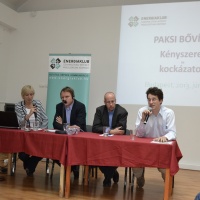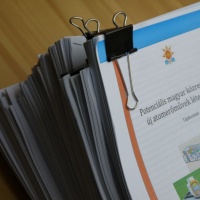Aktuális
State aid for Hungary’s Paks 2 Nuclear Plant breaches rule of law multiple times
The planned financing of the new Paks nuclear plant constitutes an unlawful state aid, and breaches the European rule of law multiple times, says Energiaklub and Greenpeace. Therefore, Energiaklub filed a submission to the Directorate-General for Competition of the European Commission, asking them to investigate the subsidy plan the Hungarian government constructed, and to take the necessary measures if needed. Greenpeace also filed a complaint to the Commission back in April. The two organisations have also requested an investigation by the Compliance Committee of the Aarhus Convention.
Paks Nuclear Expansion: consumers will pay for it
„The new nuclear units, if ever built, will operate until 2075. Who can decide responsibly about such a commitment? Most of them will not even be alive at that time” – András Perger said in his exposition. According to the project manager of Energiaklub the expansion of the Paks nuclear power plant is an investment of several decades and its price will exceed 10 billion Euros. However, forecasting is difficult, as there is hardly any information available ont he planned expansion. „Apparently no one is interested in this 10 billion Euros, while there are intensive debates over millions in the Parliament.”
PAKS NUCLEAR EXPANSION: CONSTRAINTS AND RISKS - Invitation to an event
The expansion of Paks Nuclear Power Plant has been a persistent issue in parliamentary politics, still, only little information has been leaking about the details of decision making. However, the investment amounting to billions of Euros would determine Hungary’s energy policy and economy for decades. Meanwhile, essential questions are not answered.
Several thousand barrels of nuclear waste – stored irregularly
Several thousand barrels of low and medium activity radioactive waste were stored in Bátaapáti for years without having confirmed the geological suitability of the site – this is part of the ombudsman’s statement issued in December after a serious investigation. Afterwards the Commissioner for Future Generations called on several relevant authorities, the government and the minister for rural development to take measures. There are still some issues to be cleared before the final permission is given (and the storage facility becomes operational).
The MVM did not fulfil the resolution
The Magyar Villamos Művek Zrt. (Hungarian Power Companies Ltd., MVM) did not fulfil its obligations completely under the court resolution pertaining to the Lévai project. On February 16th 2012, the Metropolitan Regional Court brought a legally binding resolution obliging the MVM Zrt. to disclose the data of the project about the planned expansion of the Paks nuclear power plant. The respondent did not disclose the project’s results as part of the requested data.
The Teller case at first instance again
Our lawsuit for the publicity of data on the Teller project achieved a new milestone: the Court of Tolna County returned the case to the court of first instance on April 4th. The court of second instance decided that production of evidence was not adequate, therefore the case was returned to the Szekszárd City Court.
Lévai project: documents received so far
Upon the legally binding resolution of the court made in February in our suit concerning data about the Lévai project, the Magyar Villamos Művek Zrt. (Hungarian Power Companies Ltd., MVM) sent a part of the documents requested (these can be downloaded under “Related content”).
Paks expansion: MVM defeated - yet again
“It is the 99,999th time that we establish that the MVM is a public interest organization”, emphasised the judge at the proceedings where the Metropolitan Regional Court delivered its legally binding resolution obliging the Magyar Villamos Művek Zrt. (Hungarian Power Companies Ltd., MVM) to disclose data of the Lévai project pertaining to the planned expansion of the Paks nuclear power plant. The respondent shall disclose the information and documents specified in the Energiaklub Policy Institute’s data request within 15 days.
Some of the Paks studies are public
We cannot access all the complete studies prepared in the course of the so-called Teller project pertaining to the planned expansion of the nuclear power plant because the Paks Nuclear Power Plant Ltd. (Paksi Atomerőmű Zrt.) sent us incomplete documents with several redacted sections. As almost 500 million forints were spent from the public budget on the project, the costs of which are estimated to possibly reach 3000 billion forints, it would be important to know what jobs and what results such an amount was paid for.
Obviously public?
"This is like a battle between David and the Goliath of the energy lobby", remarked a commenter on Facebook about the verdict of the court. The Metropolitan Court of Budapest obliged the Hungarian Power Companies Ltd. (MVM Zrt.) to disclose the data of the Lévai project on the planned expansion of the Paks nuclear power plant. This is only one of the data requests submitted by the Energiaklub in the course of the Control Energy Program (CEP) in the past two years. This raises the question – with additional topicality provided by the recent Wikileaks scandal –, what information should be public? What data can or must be public, and what are the data whose disclosure may do more harm than good?






